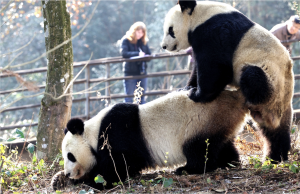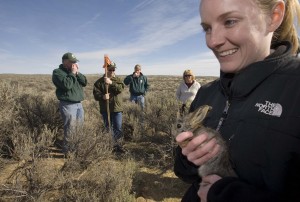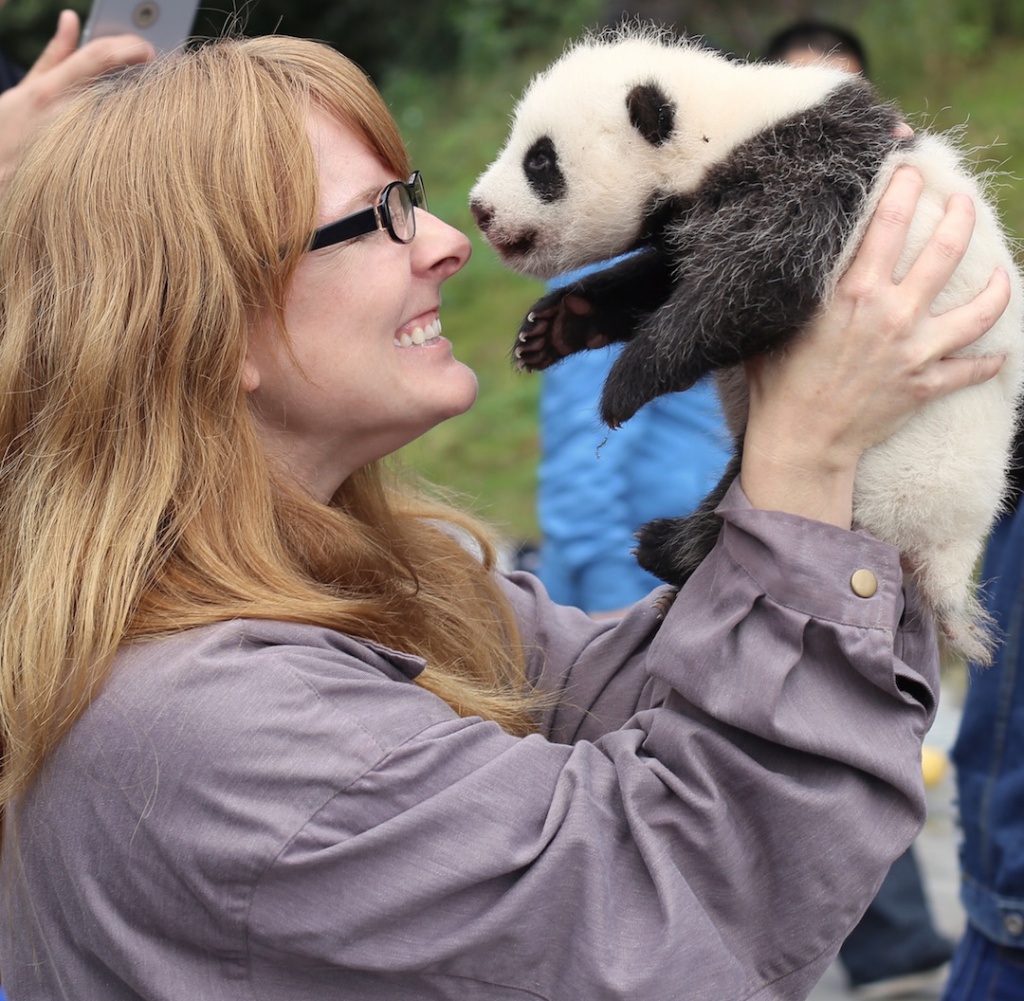Meghan Martin serves PDXWildlife as a Executive Director and conservation scientist. In this position, she researches species such as rhesus macaques, Columbia Basin pygmy rabbits, Asian elephants, and giant pandas.
 Her work addresses behavioral and ecological research to tackle conservation problems, especially those related to captive breeding. She is particularly interested in how captive breeding methods can be improved to increase reproductive success of endangered species. Meghan currently works full-time in the dual position of Executive Director at PDXWildlife and Postdoctoral Researcher at San Diego Zoo Global’s Institute for Conservation and Research in the Applied Animal Ecology Division. In addition to her research, she used to teach Conservation Biology for the new BMZA class at PCC Rock Creek and Human Anatomy and Physiology at PCC Sylvania, PCC Cascade, PCC Rock Creek, Clark College, and PSU.
Her work addresses behavioral and ecological research to tackle conservation problems, especially those related to captive breeding. She is particularly interested in how captive breeding methods can be improved to increase reproductive success of endangered species. Meghan currently works full-time in the dual position of Executive Director at PDXWildlife and Postdoctoral Researcher at San Diego Zoo Global’s Institute for Conservation and Research in the Applied Animal Ecology Division. In addition to her research, she used to teach Conservation Biology for the new BMZA class at PCC Rock Creek and Human Anatomy and Physiology at PCC Sylvania, PCC Cascade, PCC Rock Creek, Clark College, and PSU.
 Meghan graduated from Reed College, Portland, OR in 2003, with a bachelor’s of arts in biology. She immediately got a job working at the Oregon National Primate Research Center through OHSU. After two years of working with Rhesus macaques on calorie restriction and aging she received an internship to study with the Smithsonian Institute in Chengdu, China working on giant panda behavior. After completing this work she moved on to Portland State University and the Oregon Zoo, where she earned a master’s degree in 2009 in Biology focusing on animal behavior under the supervision of Dr. David Shepherdson. She was just awarded her doctoral degree in Biology with an emphasis on conservation biology at Portland State University. Directly out of her PhD studies Meghan accepted a full-time position doing what she loves – researching mate choice in
Meghan graduated from Reed College, Portland, OR in 2003, with a bachelor’s of arts in biology. She immediately got a job working at the Oregon National Primate Research Center through OHSU. After two years of working with Rhesus macaques on calorie restriction and aging she received an internship to study with the Smithsonian Institute in Chengdu, China working on giant panda behavior. After completing this work she moved on to Portland State University and the Oregon Zoo, where she earned a master’s degree in 2009 in Biology focusing on animal behavior under the supervision of Dr. David Shepherdson. She was just awarded her doctoral degree in Biology with an emphasis on conservation biology at Portland State University. Directly out of her PhD studies Meghan accepted a full-time position doing what she loves – researching mate choice in

pandas – with the San Diego Zoo Global’s Institute for Conservation and Research Giant Panda Team.
Meghan is actively involved in the mentorship of students, locally and internationally during work in China. Starting in 2015 Meghan is excited to return to China for followup studies on giant panda reproduction and continue providing undergraduate internships to students who will get the unique opportunity to live abroad in China and study giant pandas.
Publications
- Meghan S. Martin-Wintle, Shepherdson, D., Wintle, N., Zhang, G. Q., Huang, Y., Li, D., Zhou, X.P., Swaisgood, R.R. 2016. Do opposites attract? Effects of personality matching in breeding pairs of captive giant pandas on reproductive success. 2016. Animal Behavior. In preparation.
- Nathan J.P. Wintle, Meghan S. Martin-Wintle, Xiaoping Zhou and Chunxiang Tang. 2016. Total Mercury and Methylmercury in Captive Giant Pandas. Ecotoxicology. In review.
- Simon C. Griffith, Ondi L. Crino, Meghan S. Martin-Wintle & 50 others. 2016. Variation in reproductive success across captive populations: methodological differences, potential biases and opportunities. Animal Behavior. Submitted.
- Martin-Wintle, M.S., Shepherdson, D., Li, D.S., Zhang, G.Q., Zhou, X.P., Li, R., Swaisgood, R. R. 2015. Free mate choice enhances conservation breeding in the endangered giant panda. Nature Communications, 6.
- Nathan J.P. Wintle & Meghan S. Martin. An Analysis of Total Mercury in the Wild Bamboo Species (Bambusa emeiensis) from Ya’an, Sichuan, China, Journal of the American Bamboo Society, in review.
- Martin, M.S. 2013. Annotations for Panda: The Journey Home. National Geographic and Skyline.
- Martin M.S. & D. Shepherdson. 2012. The role of familiarity and preference on reproductive success in ex-situ conservation breeding programs. Conservation Biology 26(4):649-56.
- Martin, M.S., Gleaser, S.S., Finnegan, M., Hunt, K., & J.L. Brown 2012. Investigation of animal variability, synchronicity, and impact of life events on reproductive cycle dynamics through longitudinal serum progestagen monitoring of female Asian elephants (Elephas maximus) at the Oregon Zoo. Theriogenology 78 (2):285-296.
- Gleaser, S.S., Martin, M.S., Finnegan, M., & J.L. Brown 2008. Investigation of animal variability on reproductive cycle dynamics through longitudinal serum progestagen monitoring of female asian elephants (Elephas maximus) at the Oregon Zoo. In: International Elephant Foundation Meeting Proceedings; 2008 Nov; Pataya, Thailand.
- Martin, M.S., Gleaser, S.S., Finnegan, M., Brown, & J.L. 2007. Characterization of female Asian elephant (Elephas maximus) estrous cycles through longitudinal serum progestagen monitoring at Oregon Zoo. In: Elephant Managers Association Meeting; 2007 Oct; Cincinnati, OH.
- Martin, M.S., Gleaser, S.S., Finnegan, M., Brown, & J.L. 2007. Characterization of female Asian elephant (Elephas maximus) estrous cycles through longitudinal serum progestagen monitoring at Oregon Zoo. In: International Elephant Foundation Meeting; 2007 Nov; Orlando, FL.
- Koegler, F.H., P.J. Enriori, S.K. Billes, D.L. Takahashi, M.S. Martin, R.L. Clark, A.E. Evans, K.L. Grove, & J.L. Cameron. 2005. Peptide YY inhibits morning, but not evening, food intake and decreases body weight in Rhesus Macaques. Diabetes 54: 3198-3204.
Presentation
1. Panda Speed Dating: Helping an endangered species through captive breeding
Invited guest lecture Pacific University; 14 November, 2014
OMSI Science Pub at the Hollywood Theater, Portland, OR; 8 September, 2014
2. Mate preference and familiarity increases reproductive success in the endangered lagomorph Brachylagus idahoensis.
The Wildlife Society Annual Conference. Bend, OR. 2014
3. Mate choice and reproductive success in captive breeding of giant pandas
Invited guest lecture for BIO 412/512 Animal Behavior class at Portland State University.
4. Mate familiarity and preference increases reproductive success in captive breeding of endangered Columbia Basin pygmy rabbits.
Chinese Conservation and Research Center for the Giant Panda; 22, March 2012
San Diego Zoo Conservation and Research Center; 23 August, 2011
Society for Northwestern Vertebrate Biology, Stevenson, Washington; 19, February 2009
Portland State University Masters Thesis Defense, Portland, Oregon; 14, November 2008
Portland State University Alumni Event Presentations, Portland, Oregon; 18, October 2008
Oregon Zoo Brown Bag, Portland, Oregon; 15, September 2008
5. Investigation of animal variability on reproductive cycle dynamics through longitudinal serum progestagen monitoring of female asian elephants (Elephas maximus) at the Oregon Zoo.
International Elephant Foundation, Pataya, Thailand; 22, November 2008
6. A review of mortality and breeding in the endangered Columbia Basin pygmy rabbit (Brachylagus idahoensis) since inception of the captive breeding program.
Washington Department of Fish and Wildlife, Olympia, WA; 13, January 2007
7. The effect of anti-predator training on post-release survival of endangered Columbia Basin pygmy rabbits.
Oregon Zoo Brown Bag, Portland, OR; 13, November 2007
8. Breeding like bunnies – or not! Mate choice in an endangered species of lagamorph.
Oregon Zoo Brown Bag, Portland, OR; 13, November 2007
